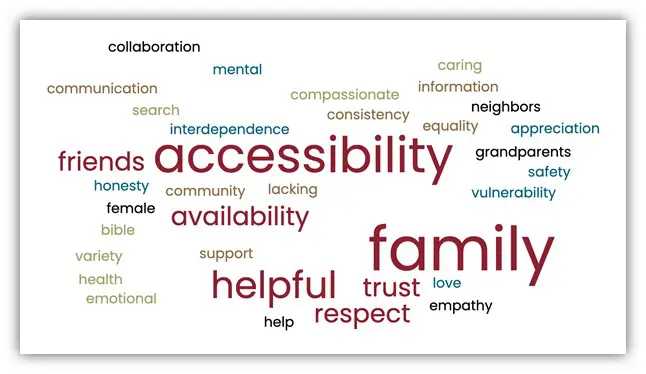Listening to Families to Learn What Helps Them Thrive

Words reflecting social support and connections that can help families thrive as expressed by participants in five Colorado communities during Colorado Lab-facilitated listening sessions.

A new Colorado Lab report features diverse and insightful learnings from community listening sessions that were held with parents/caregivers to better understand how social connections and support can help families thrive. Research shows that strong social connections support parents and caregivers in experiencing fewer stressors, buffer the negative experiences of stress when it does occur, and promote resilience. The CDC’s Essentials for Childhood framework has identified changing social norms to support parents as an evidence-based strategy for preventing child abuse and neglect.
Research for Social Support Norms Among Colorado Families was conducted in partnership with the Colorado Partnership for Thriving Families (“the Partnership”) and county and community partners at five demonstration sites—Adams, Boulder, Denver, Jefferson, and Prowers Counties. The Colorado Lab partnered with local peer facilitators to foster safe, trustworthy, and respectful environments, and conducted sessions in English, Spanish, and bilingual. Using this innovative approach, we reached over 40 parents and caregivers—centering their experiences from the start.
As shown below, information gathered through the listening sessions will inform the development and use of a Family Insight and Action Survey tool on social connections and support, and survey findings will then inform local public awareness efforts in the demonstration communities as well as statewide practices. The overarching goal is to create conditions where children and the adults in their lives—parents, family members, caregivers, providers, and educators—can thrive.
Three key findings were identified from the community listening sessions:
- The WHO of social connections. Informal support comes mostly from close relationships, such as family and friends.
- WHAT types of social support are needed and given. Social support needs exist along a continuum—including factors such as child care/transportation/financial to advice/suggestions/information to listening/empathy/love—requiring different sources of support.
- HOW support-seeking and support-offering behaviors are promoted or inhibited. Asking for and giving support happens most comfortably in mutual relationships with fewer worries about being judged, as well as in reciprocal relationships with people more willing to provide support when they know they will be supported in return.
Throughout the findings, leading cultural and community considerations were identified for parents/caregivers of children with disabilities, parents/ caregivers experiencing substance use disorders, families in rural areas, families with undocumented members, and families in lower socioeconomic status households. Other cultural and social considerations, such as language and behavioral health, are also highlighted in the study. These considerations are vital to promoting culturally responsive and community-grounded practices during norms strategy work.
“I wish that I was able to say, ‘You know what? I’m working late. I didn’t have time to cook. Can someone help me out?’ But we really don’t do that as a society much anymore, you know, and especially as women, it seems like a pride thing. I don’t know if I feel comfortable saying that [I need support], even if I really needed it.”
Based on the findings, the study team recommended that social connections should be fostered with consideration to unique cultural and community context, noting that a “one-size-fits” all strategy will not work. Cultivating both informal and formal support is also recommended to more holistically meet the continuum of needs families have. Additionally, focusing on norms related to mutual relationships is recommended as a means to reduce stigma and strengthen cohesion.
Looking forward, the research team encourages ongoing community dialogues to further expand insights and encourage action. “Future rounds should target additional affinity groups, be conducted in additional languages, and be offered through a combination of in-person and virtual dialogues at varying days and times,” said Dr. Courtney Everson, Senior Researcher/Project Director for the Colorado Lab, who led the research team. “Including more voices, and more diverse voices, can further inform and strengthen approaches to advancing norms that support health and well-being.”
To learn more about the study and listening sessions, please reach out to Dr. Courtney Everson.